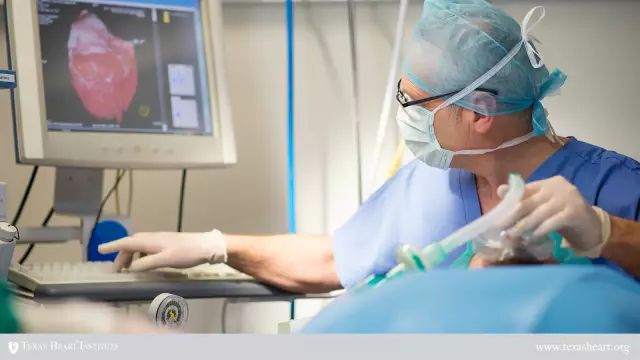- Author Rachel Wainwright wainwright@abchealthonline.com.
- Public 2023-12-15 07:39.
- Last modified 2025-11-02 20:14.
Transfusiologist
Transfusiologist is a doctor specializing in diseases of human blood and plasma.

Transfusiology is a fairly young branch of medicine that studies the issues of mixing biological and replacing fluids (blood, its components, lymph).
The founder of this direction is the physician William Harvey, who at the beginning of the 17th century in England made the first attempt at a blood transfusion based on his discovery of blood circulation in the human body. By the end of the 18th century, the first blood transfusion from person to person was carried out in America, and the direction of medicine was called transfusiology ("transfusio" - transfusion, "logs" - I report, I say, I tell).
Where do doctors transfusiologists work?
Doctors transfusiologists are in demand in various large medical clinics, medical research institutes, as well as in many military medical institutions. Today, transfusiologists are actively practicing in blood transfusion departments, transfusion therapy rooms, transfusion departments, and blood gravitational surgery departments.
For the functioning of this medical direction, a blood service has been created, the main task of which is not only the preparation and storage of blood and its individual components, but also the development of methods for examining donors.
Also, doctors transfusiologists work in such cutting-edge areas of medicine as selection, procurement and storage of stem cells, which makes this profession very promising due to the rapid development of this area of medicine.
Another area of work of transfusiologists is extracorporeal hemocorrection, which is aimed at modifying blood components outside the patient's body. The goal of a transfusion physician in this direction is to change the properties of blood or to remove pathological substances that cause or maintain disease.
Extracorporeal hemocorrection is performed by a transfusionist using plasmapheresis, which is widely used today and consists in removing a part of the plasma with toxins dissolved in it, metabolic end products and fragments of molecules that exhibit physiological aggressiveness.
Also, transfusion doctors are developing more complex clinical technologies that have been actively developing in recent years, for example, selective sorption of specific proteins.
The main areas of work of a doctor transfusiologist
There are two main areas of work for transfusiologists:
- A doctor who deals with the preparation and examination of blood. His main place of work is blood transfusion stations;
- Clinical transfusionist working directly in hospitals and providing transfusion therapy.
Both directions require from the doctor, in addition to professional knowledge and skills, increased attention, responsibility and the ability to concentrate on the matter, since the patient's life often depends on the work of the transfusion doctor.
A doctor transfusiologist working in hospitals must be able to carry out various types of blood transfusion:
- Autohemotransfusion, in which the patient acts as both a donor and a recipient of blood, as well as its components;
- Intraoperative reinfusion, based on blood sampling, which poured out into the cavity (small pelvis, chest, abdominal) during the operation, followed by washing of erythrocytes and returning them to the bloodstream;
- Indirect blood transfusion, in which preservatives and stabilizers are used during the transfusion, which makes it possible to prepare a large number of blood components for long-term storage;
- Direct blood transfusion, in which, without stabilization and preservation, there is a direct blood transfusion from the donor to the recipient;
- Exchange transfusion, in which the infusion of donated blood is performed simultaneously with the collection of the recipient's blood. This method is most often used for conditions and diseases such as massive intravascular hemolysis, hemolytic jaundice of newborns and in severe poisoning.
During blood transfusion by a doctor transfusiologist, various complications often develop, namely:
- Syndrome of tissue incompatibility associated with the response of the recipient's body to the injected foreign protein, which usually occurs when the blood of the donor and recipient is incompatible in one of the immune systems;
- Syndrome of massive blood transfusions, which usually occurs with a large volume of blood transfused;
- Syndrome of homologous blood, characterized by impaired transcapillary metabolism and microcirculation, resulting from increased blood viscosity and capillary blockage by microaggregates of platelets and erythrocytes;
- Transmission syndrome, which is characterized by the transfer of infections and other disease-causing factors from the donor to the recipient.
The main danger that transfusiologists constantly face is associated primarily with infectious diseases. Despite the fact that biological material obtained from donors is carefully checked, many infections have a long latency period. The development of new and more effective methods for examining donors by transfusiologists, which would exclude the transmission of infection, as well as the introduction of modern methods of inactivation of infectious agents circulating in the blood, is one of the highest priority tasks in this area of medicine.
One of the latest global trends in transfusiology is the gradual refusal of transfusion to recipients of plasma, which is obtained from the blood of female donors, in which anti-leukocyte antibodies often circulate, causing acute respiratory failure. These tendencies should also be taken into account in the work of the doctor transfusiologist.
How to get the profession of a doctor transfusiologist
The profession of a transfusiologist is quite popular today among young specialists in connection with the prospects for the development of a direction related to stem cells. To obtain a primary specialization in transfusiology, it is necessary to have a higher medical education, after which it is necessary to undergo an internship or residency in the specialty of therapy, surgery or anesthesiology-resuscitation.
Since transfusiology is a dynamically developing science, in which discoveries are being made today and information about both the therapeutic and possible side effects of blood transfusion and its components is constantly updated, the transfusion physician must monitor this new knowledge.
Found a mistake in the text? Select it and press Ctrl + Enter.






